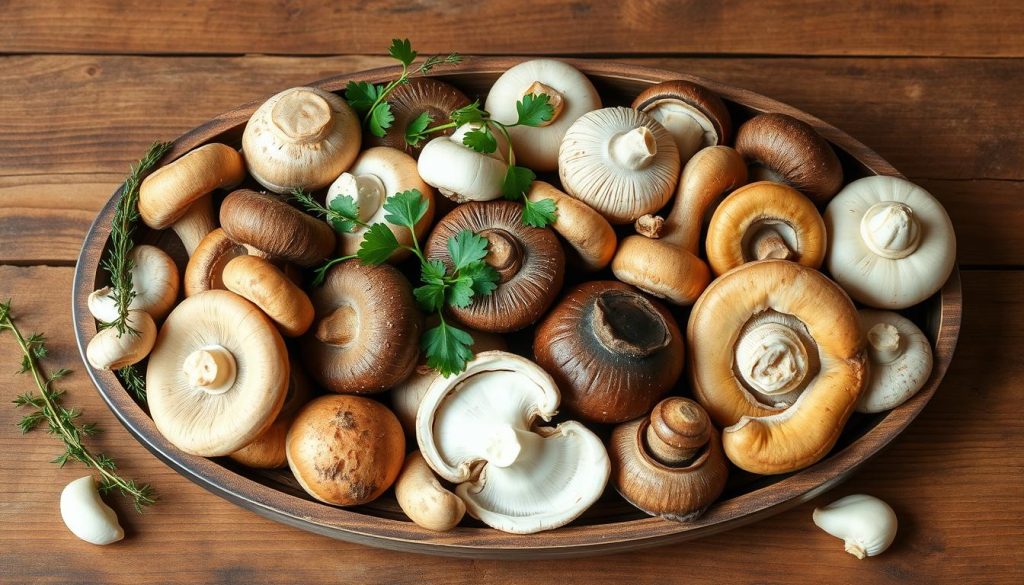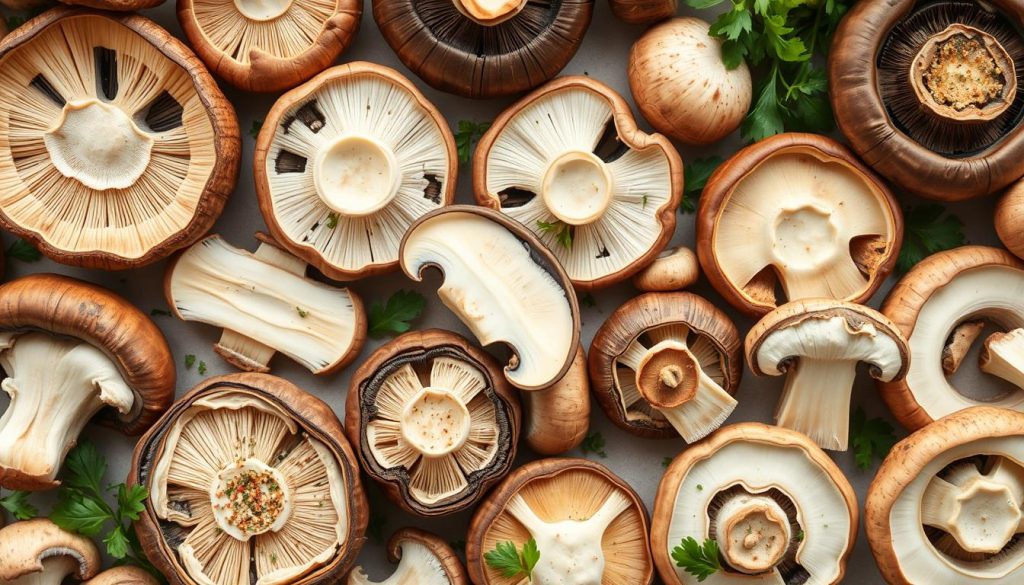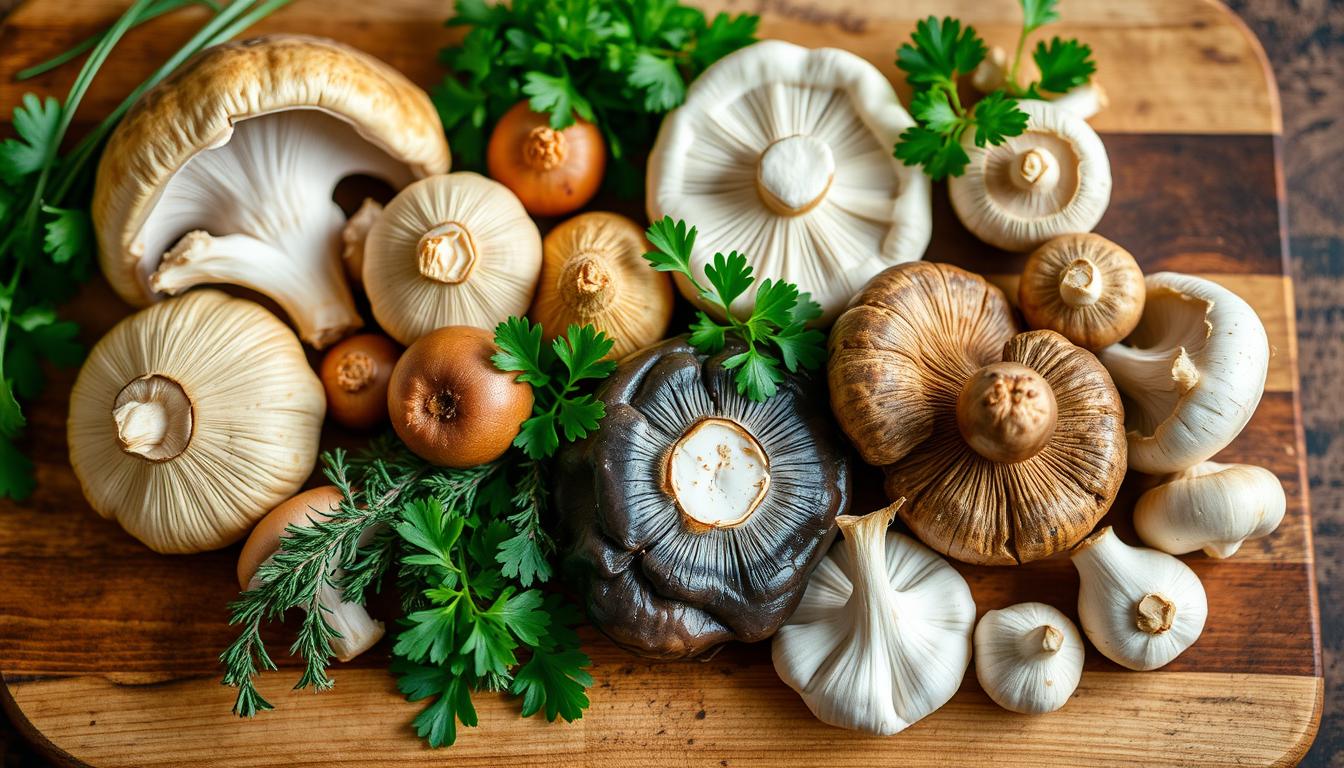Are you a fan of cooking with chestnut mushrooms? You’re not alone. These mushrooms are loved for their nutty taste and meaty texture. They’re a hit in kitchens everywhere.
But sometimes, finding chestnut mushrooms can be hard. That’s why we’ve put together this guide. You’ll learn about the best substitutes to keep your food tasty and filling.
Chestnut mushrooms are not just delicious; they’re also good for you. They’re great in many dishes, like avocado toast and creamy pasta. This article will show you mushroom and non-mushroom options for your cooking. Whether you’re cooking sautéed, roasted, or soups, we’ve got you covered.
Introduction to Chestnut Mushrooms
Chestnut mushrooms, known as Pholiota adiposa, have caps that look like roasted chestnuts. They grow in clusters on rotting wood or beech trees. This shows their role in breaking down dead wood and recycling nutrients.
These mushrooms are becoming more popular. Chefs and home cooks love them. They can be grown at home, needing cooler temperatures and humidity. The best substrate is hardwood logs or sawdust from beech trees.
Chestnut mushrooms add a nutty flavor to dishes like stews and stir-fries. They can be stored in a paper bag in the fridge for up to a week. They’re packed with protein, fiber, and vitamins, making them great for a healthy diet.
Their caps are 2 to 8 centimeters in diameter. They have a nutty flavor and a peppery finish. Their crispy stems add texture after cooking. Research is ongoing to learn more about growing them and their health benefits.
Why You Might Need a Chestnut Mushroom Substitute
The need for substitutes comes up for many reasons with chestnut mushrooms. They might not always be available at your local store. This is due to seasonal changes and issues with getting them to market.
Looking for alternatives can also happen if you have certain cooking challenges. Maybe you follow a special diet or just prefer certain tastes. Trying new things in the kitchen can make your meals more exciting.
Knowing about different substitutes can make cooking better. With the right info, you can pick the best options for your taste. This way, you can still enjoy great meals even when you face challenges.
| Reason for Substitution | Details |
|---|---|
| Availability Issues | Fresh chestnut mushrooms may be out of stock due to seasonality and supply concerns. |
| Texture Variation | Different substitutes can provide unique textures that enhance your dish. |
| Dietary Preferences | Some individuals may exclude certain mushrooms from their diets, necessitating alternatives. |
| Culinary Creativity | Trying substitutes allows for exploration of new flavors in your favorite recipes. |
Chestnut Mushroom Substitute Guide
When looking for chestnut mushroom substitutes, knowing their flavor profiles is key. Chestnut mushrooms have a bright golden-brown color and a firm texture. They offer a strong, nutty taste that gets even richer when cooked.
Understanding the Flavor Profile
Chestnut mushrooms add a special depth to many dishes. Their mild, earthy flavor enhances other ingredients without taking over. Mushrooms like shiitake or cremini are great chestnut mushroom substitutes because they share similar tastes. Shiitake brings a deep umami flavor, perfect for Asian dishes. Cremini adds a richer taste, great in soups and sauces.
Common Uses in Cooking
Chestnut mushrooms are used in many ways across different cuisines. They’re good in:
- Soups and stews
- Stir-fries
- Pasta dishes
- Grilled preparations
- Salads as a garnish
They’re great at soaking up flavors, making them a top pick for savory dishes. When picking a substitute, look for ones that match the flavor profiles of chestnut mushrooms. This helps keep your dish’s flavor true to its original.
Top Substitutes for Chestnut Mushrooms
Many mushroom varieties can replace chestnut mushrooms in cooking. Each has its own taste and texture, adding something special to your dishes. Choosing the right mushroom depends on your recipe’s needs. This flexibility makes cooking with substitutes easy.
Cremini Mushrooms: A Close Match
Cremini mushrooms, or baby bella, taste like chestnut mushrooms. They have a meaty texture, perfect for soups, stews, and pasta. You can use them in the same amount as chestnut mushrooms, making them a great choice.
Shiitake Mushrooms: Bringing Rich Flavor
Shiitake mushrooms have a strong, earthy taste. They’re great for replacing chestnut mushrooms at the same ratio. Their flavor is perfect for Asian dishes and hearty meals.
Portobello Mushrooms: Meaty Alternatives
Portobello mushrooms are big and have a deep flavor. They’re great for stews and sandwiches because of their meaty texture. Use them in the same amount as chestnut mushrooms for a tasty swap.
Oyster Mushrooms: Subtle and Versatile
Oyster mushrooms taste mild and are versatile. They’re good in stir-fries and soups. You can use them in the same amount as chestnut mushrooms, adding a nice touch to your dishes.

| Substitute | Flavor Profile | Texture | Cooking Uses | Substitution Ratio |
|---|---|---|---|---|
| Cremini Mushrooms | Earthy, nutty | Meaty | Soups, stews, pasta | 1:1 |
| Shiitake Mushrooms | Robust, earthy | Firm | Asian dishes, hearty meals | 1:1 |
| Portobello Mushrooms | Umami | Very meaty | Stews, sandwiches | 1:1 |
| Oyster Mushrooms | Mild, delicate | Soft | Stir-fries, soups | 1:1 |
Non-Mushroom Alternatives
Looking for substitutes for chestnut mushrooms? You have many options beyond mushrooms. Each one offers a unique taste and texture for different dishes. They can change how your food tastes and feels.
Tempeh: A Plant-Based Option
Tempeh is a great choice for those who want a meatless option. It tastes nutty and has a firm texture, similar to mushrooms. It’s perfect for stir-fries and stews. Just use the same amount of tempeh as chestnut mushrooms.
Artichoke Hearts: Unique Texture
Artichoke hearts have a mild, earthy taste. They’re great for adding texture to dishes like casseroles and pasta. Use them in the same amount as chestnut mushrooms for a tasty swap.
Tofu: Absorbing Flavors Well
Tofu is very flexible in cooking. It soaks up flavors well, making it a good mushroom substitute. Use firm tofu for the best results. Just like the others, use it in equal amounts to chestnut mushrooms.
Comparing Texture and Flavor of Substitutes
It’s key to know how different mushroom alternatives feel and taste. Chestnut mushrooms are meaty and have a nutty flavor. Other mushrooms offer unique qualities that change your dishes.
Here’s a detailed texture comparison and flavor profiles of various substitutes:
| Type of Mushroom | Texture | Flavor Profile | Best Uses |
|---|---|---|---|
| Closed Cup Mushrooms | Firm, versatile | Mild, earthy | Salads, sauces, stuffings |
| Cremini Mushrooms | Similar to button | Bolder, earthier | Various dishes |
| Portobello Mushrooms | Thick, meaty | Rich, intense | Stuffing, baking |
| Shiitake Mushrooms | Meaty, chewy | Woodsy, buttery | Broths, soups |
| Oyster Mushrooms | Soft, delicate | Sweet, mild | Pasta, stir-fries |
| King Oyster Mushrooms | Thick, chewy | Mild, umami | Various cooking methods |
| Porcini Mushrooms | Meaty | Creamy, earthy | Italian dishes |
| Enoki Mushrooms | Thin, crunchy | Fresh, subtle | Broths, stir-fries |
| Morel Mushrooms | Distinct, spongy | Nutty, smoky | Gourmet dishes |
Each mushroom adds something special to your cooking. Many mushrooms have umami, which means you can use less salt. This makes your food taste better. Knowing about these differences helps you pick the right mushroom for your recipe.

How to Use Substitutes in Your Recipes
Learning to use substitutes can make cooking more fun. It’s important to adjust the amounts to get the best taste. The cooking method also affects how well substitutes work.
Adjustment in Substitution Ratios
Most mushroom substitutes can be used the same amount as the original. But, remember that they have their own flavors. Here are some common substitution ratios for various ingredients:
| Type of Substitute | Recommended Ratio |
|---|---|
| Onions (in pasta dishes) | 1:1 |
| Zucchini (for stir-fry) | 1:1 |
| Sun-Dried Tomatoes (in pizza) | 1:1 |
| Lentils (in stir-fry) | 1:4 |
| Potatoes (for stroganoff) | 1:2 |
| Carrots (in chicken Marsala) | 1:1 |
Cooking Methods for Different Substitutes
Some substitutes work better with certain cooking methods. For example, sautéed mushrooms should be added early to release moisture. Firmer options like tempeh should be added later to avoid overcooking. Here are some useful cooking tips:
- Cut potatoes and squash into small pieces for even cooking.
- Rehydrate sun-dried tomatoes in boiling water before adding to dishes.
- For non-mushroom options like tofu, adjust the cooking time as they are softer.
Conclusion
Understanding the many chestnut mushroom substitutes helps keep your cooking fresh. You can use other mushrooms like cremini or shiitake. Or, you can try non-mushroom options like tofu and tempeh. Each choice can keep your dishes tasty and textured just right.
Looking into mushroom alternatives makes your cooking more exciting. It lets you change recipes based on what you have or what you like. By trying new things, you might find flavors you love even more.
With so many mushroom types out there, you have endless chances to explore. So, don’t be afraid to mix and match. The world of mushrooms and their substitutes is full of new tastes to discover.
Source Links
- https://www.merryhill-mushrooms.co.uk/blog/chestnut-mushroom-recipe-ideas
- https://foragerchef.com/brick-cap-mushroom-hypholoma-sublateritium/
- https://www.merryhill-mushrooms.co.uk/chestnut-and-white-mushroom-growing-instructions
- https://www.out-grow.com/blogs/growing-mushrooms/chestnut-mushrooms-guide?srsltid=AfmBOooyX6prxSbF8Rjuzms-R8A3QNCcB5bUjvZ3toG4UTtDF9Ym2IPi
- https://www.gardenersbasics.com/tools/blog/how-to-grow-chestnut-mushrooms?srsltid=AfmBOooenguW7Ow4qNa4KroMCBMGybGwscydvKIxiBsMMr5PD6mMKDeI
- https://northspore.com/blogs/the-black-trumpet/species-spotlight-chestnut?srsltid=AfmBOoqZCjRTcIYwSI201UqHOJqX8fF9wnSnTH3gh5r43Wdbpnt-wDRQ
- https://grocycle.com/chestnut-mushrooms/
- https://www.out-grow.com/blogs/growing-mushrooms/chestnut-mushrooms-guide?srsltid=AfmBOooTrWo2b-2jDo2fdBVSwMqT9Z1Dt00l4KXDawBR5zE0IEOgmyqU
- https://northspore.com/blogs/the-black-trumpet/5-of-the-best-chestnut-mushroom-recipes?srsltid=AfmBOopT-jcENLuZDwteuZjbv0n0n9G-gGmDV2Fhv0x9rBiFavcJ29gK
- https://www.prahranmarket.com.au/mushroom-guide/
- https://foragerchef.com/chestnut-mushroom/
- https://bakeitwithlove.com/mushroom-substitute/
- https://greatist.com/eat/types-of-mushrooms-a-guide-from-abalone-to-shiitake
- https://cookscrafter.com/chestnut-mushrooms-substitutes/
- https://www.alsothecrumbsplease.com/substitute-for-mushrooms/
- https://www.bbcgoodfood.com/howto/guide/10-types-of-mushrooms-you-need-to-try
- https://grocycle.com/mushroom-taste/
- https://www.foxfarmforage.com/foraging/distinguishing-the-flavor-profiles-of-differing-mushroom-varieties-is-like-describing-a-wine-a-guide-to/
- https://www.thespruceeats.com/mushroom-equivalents-measures-and-substitutions-1807471
- https://getonmyplate.com/substitutes-for-mushrooms/
- https://www.out-grow.com/blogs/growing-mushrooms/chestnut-mushrooms-guide?srsltid=AfmBOooe08agKpp1rAOiamkQ06MUhqdc1Ca08XlRHDXcpsYQ-jo9FLEx
- https://feralfungi.com/blogs/news/mushroom-types?srsltid=AfmBOopo88ArJ728_hTC0jAN8HVswbtbU1vPaBURcm-OtyDYwNJFwO0A
- https://www.gardenersbasics.com/tools/blog/how-to-grow-chestnut-mushrooms?srsltid=AfmBOoq0NWqqPahRx4QcRAwNoBaGD5iICioFkyAdr3avUinmM14HlTB2
